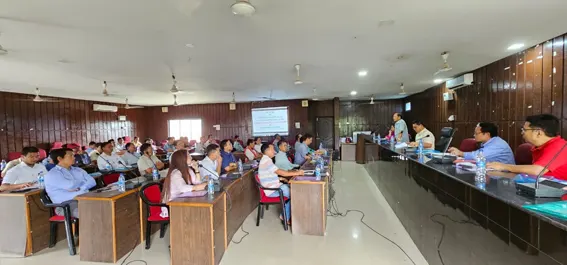YUPIA, 9 Jun: “Teachers have to be disciplined first, in order to teach discipline to the students,” said Papum Pare Deputy Commissioner Cheechung Chukhu, chairing a coordination meeting with all the principals, headmasters, field functionaries and officials of the education department here on Friday.
During the meeting, which was held to discuss the poor performance of the districts’ government schools in the recently concluded CBSE examinations, and to draw a solution for the future, the heads of schools termed “lack of discipline among the students; poor foundational education at the primary and elementary levels; lack of motivation from parents; shortage of subject teachers; inaction by the higher authority in checking non-performing teachers despite submission of written complaints by the heads of schools; non-substitution of teachers against the teachers on earned leave and maternity leave; and mid-session transfer and posting of teachers” the “main few reasons for the poor performance of the students.”
The DC in his address said that “teachers are given a high pedestal in our society; therefore their responsibility towards creating a pool of educated and responsible citizens increases manifolds.”
It was while discussing the matter of disciplining the students that the DC said that the teachers themselves should be disciplined to teach discipline to the students.
Besides advising the attendees to conduct parents-teachers meetings from time to time, Chukhu urged the heads of schools to “submit the issues pertaining to the schools to the DDSE in written form, which shall be endorsed to the higher authority for corrective interventions.”
DDSE TT Tara on his part said, “Shifting the blame to the parents and students alone for the dismal results is uncalled for. The teachers are also part of the failure as they do not work up to the expectations and are equally responsible for the poor performance of the students.”
“Punctuality, dedication and sincerity among the teachers are vital for improving the quality of child, and thus, every teacher must introspect and work to inculcate these habits,” he added.
He also exhorted the field functionaries (BEOs, BRCCs, and CRCCs) of the district to “remain proactive in mitigating the degrading quality of education in their respective jurisdiction.”
Following the discussions, the heads of schools emphasised the need to “mandatorily implement and appoint vocational subject teachers of tour and travel and information communication technology to minimise the fail percentage,” besides “strictly regulating the passing pattern of the APSB examination and addressing infrastructural gaps like hostels and boundary walls.”
ISSE DPC Tang Moromi presented a brief on “the various schemes being implemented along with the CBSE results in the last five years.” (DIPRO)



